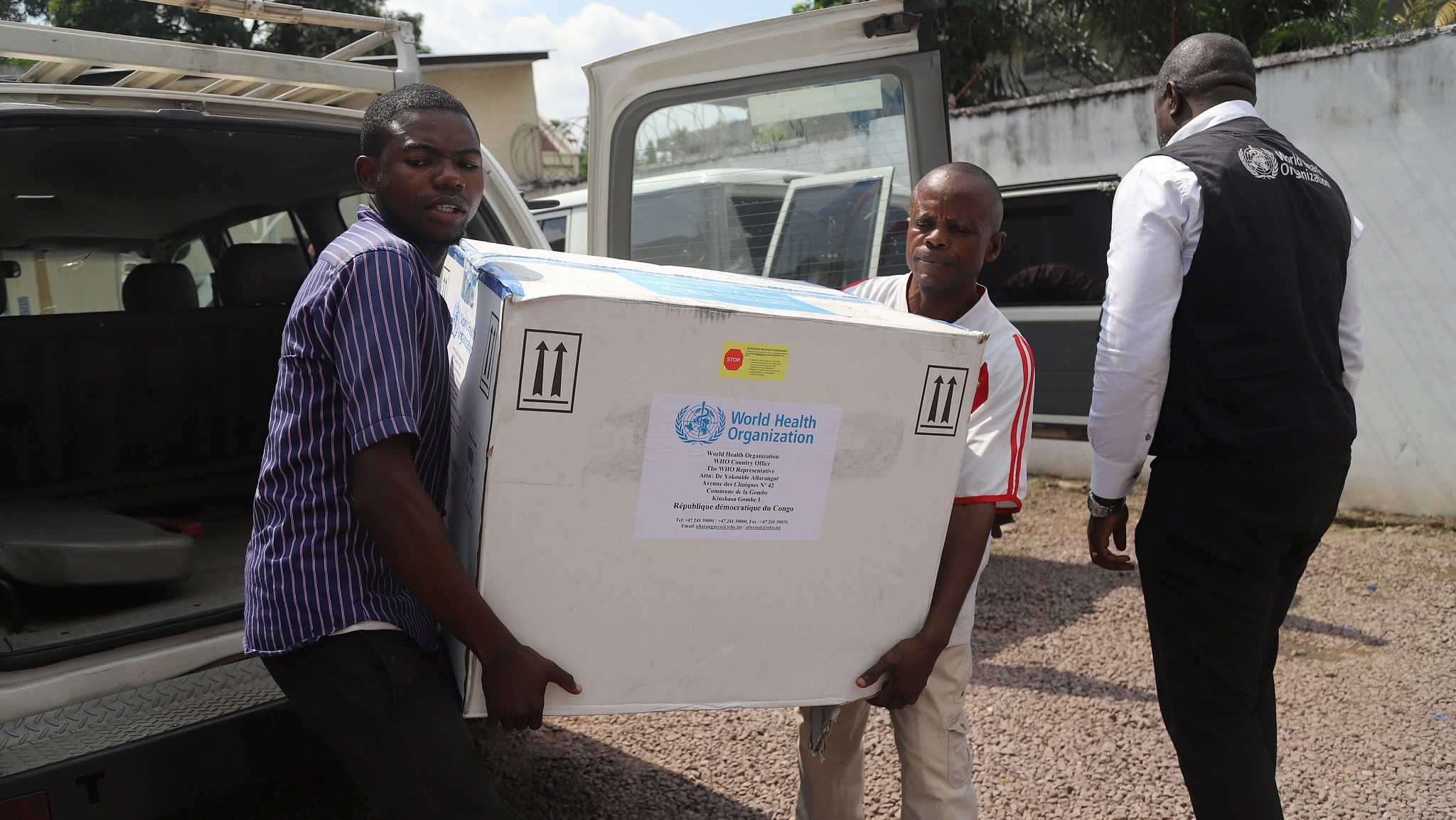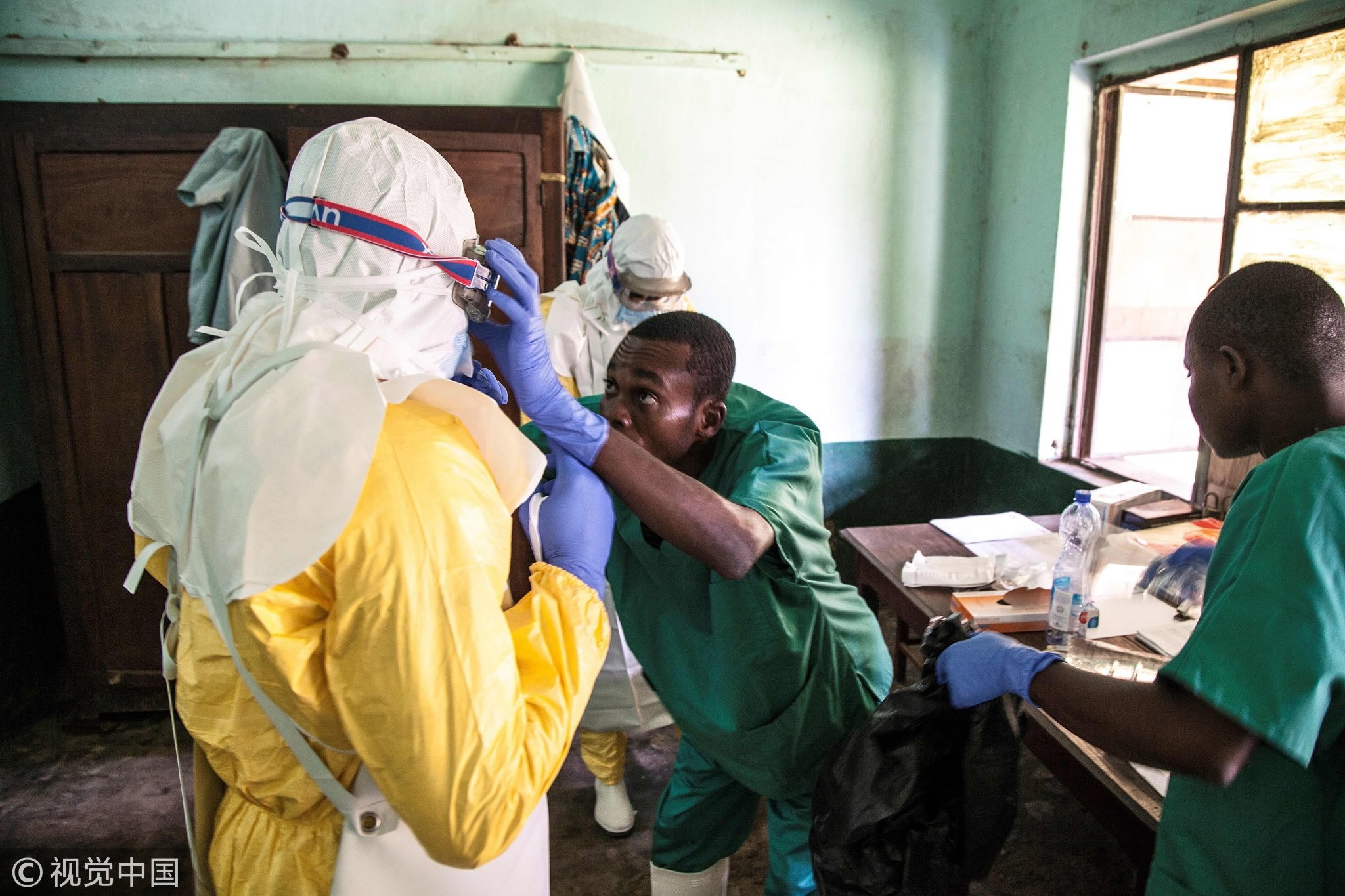
World
12:30, 18-May-2018
Ebola case in DRC city prompts fears of regional spread
CGTN

A new case of Ebola in the northwestern Democratic Republic of Congo (DRC) city of Mbandaka, a good distance from previous cases, prompted fears Thursday that the deadly disease might spread throughout the region, with the UN also scrambling to deploy an experimental vaccine.
Twenty-three people have died since May 8 in what is the DRC’s ninth outbreak of Ebola.
Previous cases had been reported in a rural part of Equateur Province in the northwest, where the disease might not travel quickly.

Handout photograph released by UNICEF showing health workers wearing protective equipment as they prepare to attend to suspected Ebola patients at Bikoro Hospital, Democratic Republic of Congo, May 12, 2018. /VCG Photo
Handout photograph released by UNICEF showing health workers wearing protective equipment as they prepare to attend to suspected Ebola patients at Bikoro Hospital, Democratic Republic of Congo, May 12, 2018. /VCG Photo
But the DRC's health ministry and the World Health Organization (WHO) on Thursday said a case had been confirmed in Equateur's capital Mbandaka, about 150 kilometers from the Bikoro area where the outbreak originated.
The international NGO Doctors Without Borders (MSF), quoting local officials, meanwhile said 514 people were believed to have been in contact with Ebola patients and were now being monitored.
"This does change the way we need to respond," Peter Salama, WHO's medical emergency program head told Reuters TV in Geneva, following news of the fresh case. "Overnight, Mbandaka has become the number one priority for preventing this outbreak from getting out of control."
A city of about 1 million, Mbandaka is connected by the Congo River to the country’s capital Kinshasa, as well as surrounding countries like the Republic of Congo and Central African Republic, raising fears the disease could spread throughout the region via river transport.

Fishing vessels are seen docked along the Congo river in the Democratic Republic of Congo's capital Kinshasa, December 21, 2016. /VCG Photo
Fishing vessels are seen docked along the Congo river in the Democratic Republic of Congo's capital Kinshasa, December 21, 2016. /VCG Photo
In Mbandaka on Thursday, the mood among many people changed from insouciance to worry as news of Ebola's spread was announced on the radio.
Bars, restaurants and public offices set up basins of water and soap dispensers for people to wash their hands, while at the city's airport, health ministry workers were taking travelers' temperatures with laser thermometers, a reporter with AFP news agency saw.
Congolese and UN officials meanwhile scrambled to work out the logistics of keeping newly arrived vaccines well below freezing in a steamy region on the equator with unreliable power.
The experimental but highly effective vaccine, which is being administered to health workers first, normally needs to be kept at minus 80 degrees Celsius.
The vaccine’s effectiveness "has been proven and validated," Health Minister Oly Ilunga told Reuters. "Now that we are facing the Ebola virus, we must use all the resources we have."
Ebola is lethal and highly contagious, which makes it difficult to contain, especially in urban environments where people are mobile and come into more contact with others. Lacking an arsenal of drugs to treat the virus, doctors isolate patients and trace people who have been in contact with them.
The deadliest ever Ebola epidemic in 2014-2016 killed more than 11,300 people in Guinea, Sierra Leone and Liberia, and sparked an international panic.
The WHO has said it is now sending 30 experts to Mbandaka, while MSF said it was sending several tonnes of medical supplies there.
"The arrival of Ebola in an urban area is very concerning and WHO and partners are working together to rapidly scale up the search for all contacts of the confirmed case in the Mbandaka area,” the WHO’s regional director for Africa, Matshidiso Moeti, said in a statement on Thursday.
Fighting the disease is made more difficult by the situation on the ground. One of the world's most volatile countries, DRC is mired in poverty and corruption, and basic infrastructure – hospitals, roads, electricity – are a major obstacle in remote areas.
(Top picture: Congolese Health Ministry officials carry the first batch of experimental Ebola vaccines in Kinshasa, Democratic Republic of Congo, May 16, 2018. /VCG Photo)
10710km
Source(s): AFP
,Reuters

SITEMAP
Copyright © 2018 CGTN. Beijing ICP prepared NO.16065310-3
Copyright © 2018 CGTN. Beijing ICP prepared NO.16065310-3